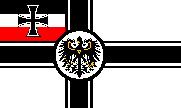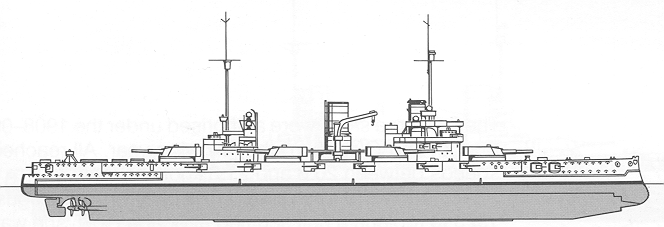
SCHLACHTSCHIFFE
Germany's First Dreadnoughts - SMS Nassau, Westfalen, Rheinland, and Posen

Like the rest of the world, Germany was caught flat-footed by the appearance of the revolutionary HMS Dreadnought in 1906, but Germany had already been working to modify their 1901 design with more armor plating and underwater protection. Using the same turret layout as the large armored cruiser SMS Blücher, designed as a complimentary armoured cruiser, Nassau mounted a uniform armament of 280mm (11") guns in six twin turrets that provided an eight gun broadside (two more than Dreadnought.) The 280mm gun was chosen because a quicker firing gun was thought to be an advantage in the misty North Sea, where long range gunnery duels were thought unlikely, while making the ship beamier than her rivals made them steady platforms for those guns. Unlike British battleships, the German dreadnoughts retained triple expansion steam engines because turbines were not yet deemed reliable enough.
Together, the four ships composed the 2nd Division of the 1st Geschwader (Squadron) of the High Seas Fleet and saw action at Jutland. They took no major hits during the action. They were in the van during the night and were heavily engaged with British light cruiser squadrons and destroyers, sinking several.
As they were the oldest German battleships, the Nassau and Helgoland classes were not required by the Armistice to sail for Scapa Flow and thus were taken intact after the "Grand Scuttle." In fact, after a serious grounding in the Ålandsee in April 1918, SMS Rheinland was basically decommissioned and served as an accommodations ship. Officially stricken from the Navy List on 5 November 1919, all four ships were surrendered to the Allies and eventually scrapped between 1919-24.
Recognizing that even in a short-range duel the 305mm (12") gun had advantages the RMA began work on an up-gunned successor, SMS Helgoland.
PHOTOS
SMS Nassau
Plans and Construction
 Line Drawing - Top and Side Views
Line Drawing - Top and Side Views
 Line Drawing - Side View (Gröner)
Line Drawing - Side View (Gröner)
 Line Drawing - Top and Side Views (Greger)
Line Drawing - Top and Side Views (Greger)
 Line Drawing - Side View (Greger)
Line Drawing - Side View (Greger)
Active Duty
 Starboard Bow View
Starboard Bow View
 Starboard Bow View
Starboard Bow View
 View of Port Side during counterflood tests
View of Port Side during counterflood tests
 Port View (U.S. National Archives)
Port View (U.S. National Archives)
SMS Westfalen
Active Duty
 View of Starboard Bow
View of Starboard Bow
 View of Port Side (U.S. National Archives)
View of Port Side (U.S. National Archives)
 View of Port Bow
View of Port Bow
SMS Rheinland
Active Duty
 View of Starboard Bow - Photo appears to have been slightly modified
View of Starboard Bow - Photo appears to have been slightly modified
 Foc'sle View of "A" and "B" turrets firing during gunnery exercise - 1914
Foc'sle View of "A" and "B" turrets firing during gunnery exercise - 1914
 Foc'sle View during small arms exercise - 1914
Foc'sle View during small arms exercise - 1914
 Foc'sle View during small arms exercise - 1914
Foc'sle View during small arms exercise - 1914
 Quarterdeck View of "C" and "D" turrets firing during gunnery exercise - 1914
Quarterdeck View of "C" and "D" turrets firing during gunnery exercise - 1914
 View of Port Side (U.S. National Archives)
View of Port Side (U.S. National Archives)
SMS Posen
Active Duty
 View of Starboard Side (U.S. National Archives)
View of Starboard Side (U.S. National Archives)
 View of Port Side (U.S. National Archives)
View of Port Side (U.S. National Archives)
SPECIFICATIONS
Project Name: Ersatz Bayern (Nassau) | Ersatz Sachsen (Westfalen) | Ersatz Württemberg (Rheinland) | Ersatz Baden (Posen)
Builder: Imperial Dockyard, Wilhelmshaven | AG 'Weser', Bremen | AG Vulcan, Stettin | Germania Dockyard, Kiel
Laid Down: July 22, 1907 | August 12, 1907 | June 1, 1907 | June 11, 1907
Launched: March 7, 1908 | July 1, 1908 | September 26, 1908 | December 12, 1908
Commissioned: October 1, 1909 | November 16, 1909 | April 30, 1910 | May 31, 1910
Sunk: None were sunk
Scrapped: All except Westfalen were scrapped at Dordrecht, Germany, 1919-1922. Westfalen was scrapped at Birkenhead in 1924.
Displacement: 18,873 tonnes (designed) / 20,535 tonnes (maximum)
Dimensions (meters): 146.1 (overall) x 26.9 x 8.76
Dimensions (feet): 482.13 (overall) x 88.77 x 28.91
# of Shafts: 3
# of Blades: 3, 5.0m diameter
# of Rudders: 2 (side by side)
Max Speed/Range: 20.0 kts / 9,400 nm at 10 kts
Main Battery: Twelve 280mm (11")/45 caliber - 6 dual turrets
Secondary Battery: Twelve 150mm (5.9")/45 caliber - single casement mounts
Anti-Torpedo Boat / Anti-Aircraft Battery: Sixteen 88mm (3.5")/45 caliber - single mounts
Torpedo Tubes: Six 45cm tubes (all underwater - one bow, one aft, two mounted on each side- one just forward of "Anton" turret, one aft of "Dora")
Complement: 40 officers and 968 enlisted (as designed)
LINKS TO OTHER WEB-SITES
Warships of the World German Naval Guns
Warships of the World Pre-World War II German Torpedoes
German Kriegsmarine Encyclopedia
Back to Schlachtschiffe.
Back to Home.